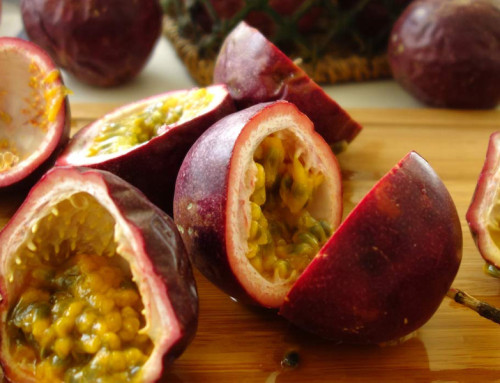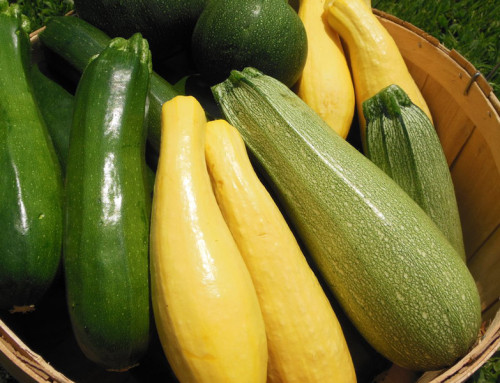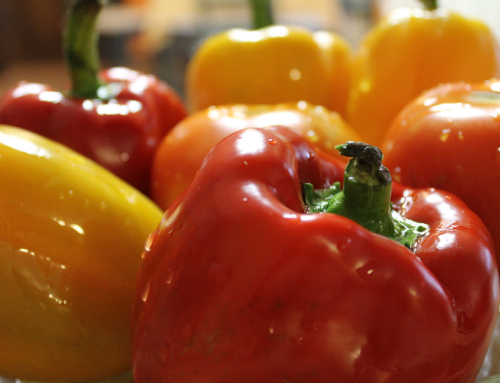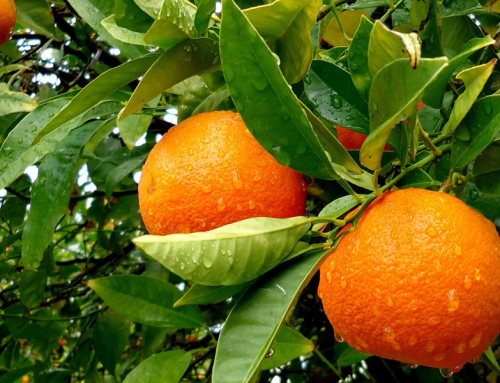Because of the differences in sizes, as well as minor nutrient differences, it’s not a simple thing to say “avocados have X calories”. If you are just looking at avocados by size, the calories will fool you. The average Florida avocado has 300 calories while the smaller California Hass has 200 calories. However, California avocados have a higher percentage of fat which gives them more calories by weight. They also are 19% oil.
The general measurement used for serving sizes of most foods is based on 100 grams or 3.5 ounces, but for the avocado, the serving size is much smaller due to it being such a nutrient dense fruit. The weight of a single serving size, which is 1 ounce, or 28 grams, is about the visual size of a golf ball. Therefore, a medium sized, 5 ounce avocado has about 5 servings, each with between 30 to 50 calories and containing nearly 20 vitamins and minerals which makes it a nutrient-dense choice.
- Florida avocado, 1 ounce = 33 calories
- Hass, or California avocado, 1 ounce = 50 calories
For dehydrated avocado, usually known as Freeze Dried Avocado Pulp Powder, 686 calories are in 100 grams of powder. It is not known if regular dehydrating works with avocado, but you are welcome to try.
- About 75% of an avocado’s calories come from fat, most of which is monosaturated fat, the good kind of heart-healthy fat.
- On a 100 g basis, avocados have 35% more potassium (485 mg) than bananas (358 mg).
- One cup of pureed avocado has…19.62 g – Carbohydrate, 4.5 g – Protein, 1166 mg – Potassium, 23.0 mg – Vitamin C, 175 mg – Beta-sitosterol, 0 mg – Cholesterol.
- Avocados have a high fiber content of 75% insoluble and 25% soluble fiber.
- One cup of avocado has 23% of the recommended daily intake of folate. Diets that are rich in folate have a much lower incidence of heart disease and stroke. Avocados contain vitamin E, monounsaturated fats which are also good for cardiovascular health.
- Avocados are the best fruit source for vitamin E, which is an essential vitamin that protects against many diseases and helps to maintain overall health.
- Avocados are an excellent source of glutathione which is an important antioxidant that has been said to be important in preventing aging, cancer, and heart disease.
- Avocados contain large amounts of sterolins, a protein that can reduce the appearance of age spots, scars and sun damage.
- Avocados are high in oleic acid which has been shown to prevent breast cancer. This compound is also found in olive oil.
- Avocados have been shown to inhibit prostate cancer growth.
- Certain antioxidants in avocados appear to be able to seek out pre-cancerous and cancerous oral cancer cells and destroy them…without harming healthy cells.
- Avocados have higher amounts of carotenoid lutein than any other common fruit and protects against age-related macular degeneration and cataracts.
- Avocados contain a high amount of beta-sitosterol that has been shown to lower cholesterol levels. One study showed that 45 participants had an average drop in cholesterol of 17% after eating avocados for only a single week.
- Avocado oil may lower blood pressure and also influenced fatty acid composition in the heart, leading the researchers to conclude from a preliminary animal study that generous amounts of avocado oil in the diet may improve blood pressure.
Most websites give the number of calories based on various sizes found in the U.S. Department of Agriculture National Nutrient Database, but there are other databases and the avocado reference source may not be known, which is why you may find many different answers around the internet. This means that In order to get accurate nutrition information about fat and calories, you need to know which avocado is being referenced in the data, and hopefully, it’s the same type of avocado that you’re eating.
Avocado cultivation dates back to the Aztec civilization. It is known to improve heart health, aid in weight loss, provide a good source of vitamins B, C and E, K, folate, fiber rich in monounsaturated fats, and is safe to use in baby food and also in diabetic diets. They also have a reputation for fighting aging by keeping the skin looking young, moist and wrinkle-free, and helping to prevent dry and acne prone skin.
The name “avocado” comes from the Spanish word “aguacate”. This, in turn, is derived from the Aztec word “ahuacatl” which has been translated as the word for “testicle.” It is believed that it is a reference to the way the fruit hangs from the tree, and it has been thought of as an aphrodisiac for centuries.
There are two main varieties of commercially available avocados in the United States. They are usually referred to as California or Florida avocados. The California variety is also known as the Hass avocado and has a dark, bumpy skin. The Florida avocado has a smooth green skin and is twice as large. California avocados are richer, creamier, with more flavor and they make tastier guacamole. Florida avocados hold their shape better, are harder to mash, and don’t get slimy.
The Hass avocado, also known as an “alligator pear” is the most common avocado seen in stores. It has a dark green, nearly black, bumpy skin that is rather reminiscent of an alligator. The Hass trees produce fruit year-round and account for nearly 80% of the commercial avocados in the world. Interestingly, all Hass trees are descended from a single highly productive tree of an uncertain subspecies of Guatemalan type that was grown by a mail carrier and was patented in 1935. This mother tree finally died in 2002 of root rot and was cut down, but the Hass children trees live on.
You may run across a “Lite” avocado, but this is nothing new nor anything special. It is simply a Florida avocado. Since they have less fat, marketing gurus thought it might be a great idea to make them sound healthier with all the bad press that fats are getting these days. But, if you plan on eating a whole avocado, you are much better off with a whole California avocado, even though it has more fat per ounce, simply because it’s half the size.
That giant choke-a-horse seed pit is edible!
It’s packed with nutrients, even more than the fruit is, but don’t eat it raw!
The seed pit is as much as 70% higher in antioxidants than the fruit itself, or just about any fruit or vegetable, and are much higher in potassium. However, the level of potassium declines as the fruit ripens. They also have more polyphenols than green tea, plus they are have more soluble fiber than oatmeal and just about any other food.
However, there is a danger. Avocado seed pits contain compounds that are “anti-nutritional,” such as tannins that could be toxic in extremely large quantities. However, cooking the seeds, by boiling them or slicing and roasting in the oven, will destroy these compounds.
Boil your seed pits and dry them. Put them in a plastic bag and beat them to death with a hammer as a great stress relief method. Then grind the pieces, (about a half a seed at a time) into a powder. You will need a high-powered food processor or blender for this task, as the seeds are likely to kill a cheap blender. You can add 1 to 2 teaspoons of powder to smoothies and sauces, or even add it to your guacamole. The powder can be stored in an airtight container for future use. The seeds are mildly bitter, but not so much that it overpowers a smoothie or a strong sauce, but go easy on the amount unless you actually like bitter food. Avocado seed pits can also be grated, roasted and into a bitter tea that is considered to be good for asthma sufferers.
- Avocado seed pits have anti-inflammation qualities that help with arthritis and other joint diseases, the GI tract and can prevent diarrhea.
- Avocado seed pits have many phenolic compounds that help prevent gastric ulcers, bacterial and viral diseases.
- Avocado seed pits have a flavonol that prevents cancer tumor growth, at least in rats.
- Avocado seed pits have antioxidants that can boost your immune system and slow the aging process.
Benefits of Avocado Oil
- Avocado oil from the seed pit is also full of antioxidants, lowers cholesterol, and helps prevent cardiovascular disease, and prevent strokes.
- Avocado oil has some unusual and uniquely healthy properties. Avocado oil is high in vitamin E and unsaturated fats; contains more protein than any other fruit; and has more potassium than a banana.
- As a topical cosmetic, oil that has been extracted from the seed pits has been shown to clear up psoriasis and increase collagen in the skin and helps to keep it young-looking and wrinkle free. The oil also makes hair shiny, and helps get rid of dry dead skin.
- Avocado oil contains the highest amount of sterolins, making it an ideal topical ingredient in moisturizers lipsticks, bath oils, hair conditioners, make-up bases and is the most effective type of sunscreen because of its rare ability to both be absorbed quickly by the skin and to sooth and calm the skin.
- It can also increases the amount of collagen found in the skin. Avocados do not clog pores, so facial masques of avocado are a common use.
- Avocado oil in combination with soybean oil extract has received prescription drug status in France and is currently being marketed in Denmark as a food supplement for an anti-inflammatory effect and the ability to stimulate cartilage growth and repair. This oil combination has been successful in treating the osteoarthritis symptoms of the knees and hips, but researchers have noted that while arthritis symptoms did improve, no structural improvements in the cartilage were observed.
- The avocado and soybean oil combination also has anti-inflammatory effects that may be helpful in preventing the bone erosion that is associated with periodontal disease.
Even though the seed pit is edible, the skin and other parts are NOT, so don’t even try it.
In fact, all parts of the avocado, such as the bark, leaves, skin, or seed pit have been documented as toxic to the following animals: dogs, cats, goats, cattle, horses, rabbits, rats, fish and birds. Never feed an avocado, even the fruit, to an animal, and keep the fruit out of reach.
This does make you wonder how we humans get away with eating these things, doesn’t it? Well, to be honest, some people actually do have allergic reactions to avocados. People with a tree-pollen allergy tend to develop symptoms in the mouth and throat shortly after eating one. People who are allergic to latex (actually fruit-latex) may have life-threatening symptoms such as an all-over skin rash, abdominal pain, and vomiting. So, if you have never eaten an avocado before, be careful with your first one.
Unusual Properties of Avocados
The most unusual is that better nutrient absorption from other foods occurs when avocados are eaten with them. Fat-soluble carotenoids rely on dietary fats, but most foods that are high in carotenoids are low in fat, except the avocado. Research has found that certain nutrients are absorbed better when eaten with avocado. Both high and low doses of avocado oil was shown to enhance the alpha-carotene, beta-carotene and lutein absorption from a salad by as much as 15 times compared to a salad without avocado oil.












